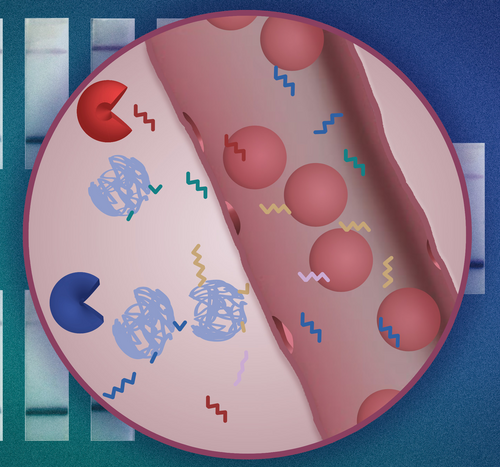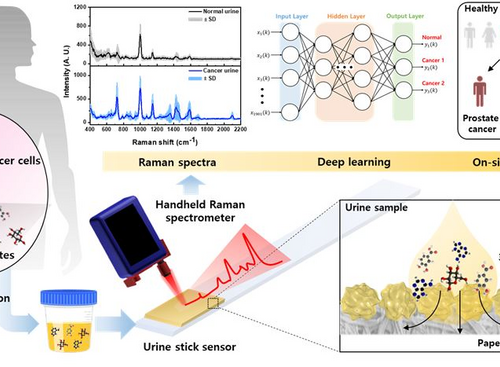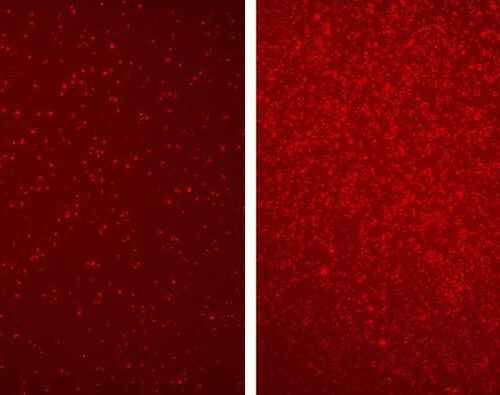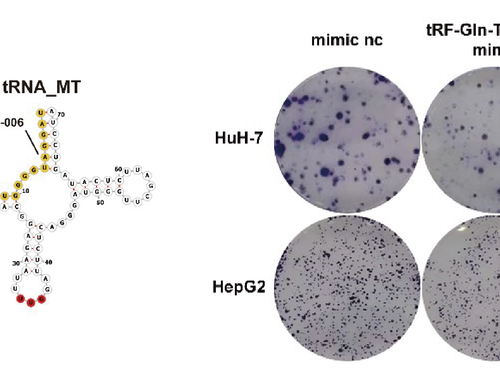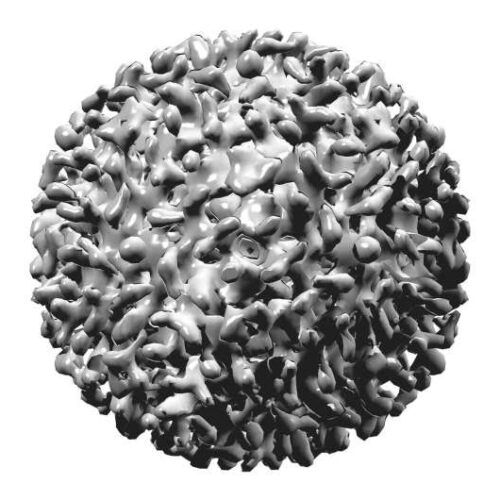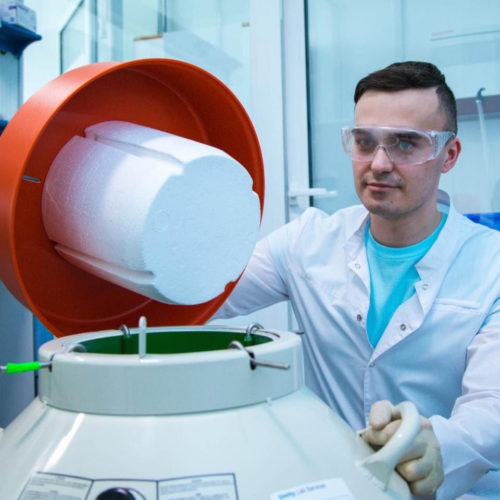MASSACHUSETTS INSTITUTE OF TECHNOLOGY IMAGE: MIT ENGINEERS HAVE DESIGNED A NEW NANOPARTICLE SENSOR THAT CAN ENABLE CANCER DIAGNOSIS WITH A SIMPLE URINE TEST. THE NANOPARTICLES (BLUE) CARRY DNA BARCODES (ZIGZAG LINES) THAT CAN BE CLEAVED BY CANCER-ASSOCIATED PROTEASES IN THE BODY (PAC-MAN SHAPES). ONCE CLEAVED, THE DNA BARCODES CAN BE DETECTED IN A URINE SAMPLE....
Tag: <span>Cancer diagnosis</span>
tRNA biomarkers for cancer diagnosis and prognosis enabled by new method
by Center for Genomic Regulation Credit: Eva Novoa/Center for Genomic Regulation (CRG) Ribonucleic acid (RNA) molecules are present in all living cells, with different types of RNA having different jobs. For example, messenger RNA is copied from DNA and carries instructions on how to make a protein. Transfer RNA (tRNA) links the mRNA sequence with...
Cancer diagnosis using urine!
NATIONAL RESEARCH COUNCIL OF SCIENCE & TECHNOLOGY IMAGE: SCHEMATIC ILLUSTRATION OF ‘DEVELOPMENT OF ON-SITE APPLICABLE STRIP-TYPE SENSOR FOR CANCER DIAGNOSIS THROUGH THE AMPLIFICATION OF URINE METABOLITES’ DEVELOPED BY DR. HO SANG JUNG’S RESEARCH TEAM AT KOREA INSTITUTE OF MATERIALS SCIENCE CREDIT: KOREA INSTITUTE OF MATERIALS SCIENCE (KIMS) □ A research team led by Dr. Ho Sang Jung...
Manicure Gone Wrong Leads to Cancer Diagnosis
Lisa O’Mary January 17, 2023 A California woman developed skin cancer after getting a cut during a manicure. Now, she and her doctor are spreading the word about her ordeal as a lesson that speed and persistence in seeking treatment are the keys that make her type of cancer – squamous cell carcinoma — completely curable. “She...
Putting liquid biopsies on solid ground: Cancer diagnosis from a milliliter of blood
by Weizmann Institute of Science Different patterns of epigenetic markers revealed by EPINUC on blood nucleosomes (bright-red dots) of a healthy person (left) and a colorectal cancer patient (right). Credit: Weizmann Institute of Science Blood tests—simple, noninvasive and economically feasible—promise to become the next major milestone in cancer diagnosis. However, most of these tests, dubbed...
New study indicates people with current cancer diagnosis may face severe complications from COVID-19
by Stephanie Winn, UC Davis Credit: Unsplash/CC0 Public Domain A new study has found that a current cancer diagnosis posed a significant risk for severe outcomes during the first two years of the COVID-19 pandemic, including ICU admission and death. UC Davis Comprehensive Cancer Center researchers took part in the study, which was published this...
New method revolutionizes cancer diagnosis
How does cancer arise? How does cellular composition influence tumor malignancy? These questions are profound and challenging to answer, but are crucial to understanding the disease and finding the right cure. Now, a German-Danish team led by Matthias Mann has developed a ground-breaking technology called ‘Deep Visual Proteomics’. This method provides researchers and clinicians with a...
Researchers identified a new tsRNA in blood to improve liver cancer diagnosis
HIGHER EDUCATION PRESS IMAGE: POSITION OF TRF-GLN-TTG-006 IN THE CLOVERLEAF SECONDARY STRUCTURE (LEFT) AND ITS INHABITED ABILITY TO COLONY FORMATION OF BOTH HCC CELL LINES (RIGHT). CREDIT: HIGHER EDUCATION PRESS LIMITED COMPANY Hepatocellular carcinoma (HCC) is the most primary liver cancer. It is one of the most common and mortal cancer worldwide, especially in East...
Hepatitis B virus can trigger genetic changes in liver cells years before cancer diagnosis
by The Francis Crick Institute Credit: CC0 Public Domain Researchers at the Francis Crick Institute and Universidade de Santiago de Compostela have identified how the hepatitis B virus (HBV) can support the survival and growth of liver cancer, with this process starting early in tumor development; in some instances up to 20 years before cancer...
Scientists found out how nanoparticles kill cancer cells
In the authors’ opinion, this research will help to treat oncology IMMANUEL KANT BALTIC FEDERAL UNIVERSITY CREDIT: IMMANUEL KANT BALTIC FEDERAL UNIVERSITY Scientists from the Immanuel Kant Baltic Federal University (IKBFU) and National University of Science and Technology “MISiS” have studied how magnet nanoparticles affect cancer cells in the human liver. In the authors’ opinion,...
- 1
- 2

